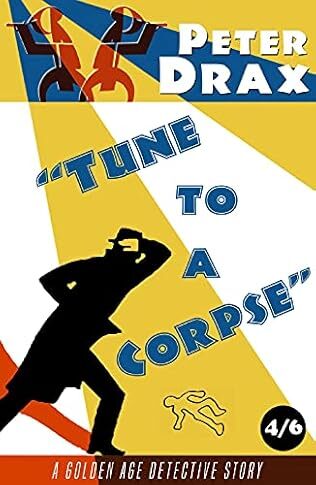Tune To A Corpse

A review of Tune to a Corpse by Peter Drax – 241025
The fourth novel written by Peter Drax, originally published in 1938 and reissued by Dean Street Press, was one of two of his books that were published in the United States, under the alternative title of Crime to Music. More of a seedy thriller than an inverted murder mystery, it is full of gritty realism, almost ahead of its time in its portrayal of the realities of crime, as it explores life in the lower reaches of London’s criminal demi monde.
It follows the final stages of the career of the soi-disant Captain Eric Macrae, a chancer, always on the look out for easy money, who lives by his wits, and experiences periods of famine interspersed with the occasional, always brief, moments of relative wealth. He cuts a dash and is viewed as a gentleman, a man who speaks well and always has his trousers well pressed.
With the need to raise some money to pay off a pressing debt, Macrae cannot resist the opportunity to lift some pearls belonging to Mrs Keene, a woman who pays him to act as his dining companion, to pawn. However, before he can retrieve the pearls and replace them before their absence is noticed, he is hit by a couple of pieces of misfortunes. Mrs Keene does notice they are missing and calls in not only the police but also her insurance company. The resulting hue and cry alerts the pawnbroker, Abie Russ, to the value of the jewels and he sets out to double cross Macrae. The only way of cutting this Gordian knot that Macrae can visualize is to commit murder most foul, retrieve the jewels and return them.
And so Macrae sets in motion a chain of events that inevitably and ineluctably lead to his own demise. He is not bright enough to concoct a convincing story to provide him with an alibi, even though the police have at best only circumstantial evidence against him, and in his darkest hours his conscience will not rest as he considers the enormity of his crime. It is a fine study of the tortured psychology of a criminal who has bitten off more than he can chew, of a man who through a series of apparently chance decisions and rash acts becomes more and more tightly enmeshed in a web from which he cannot escape. Although we know what the outcome will be, it is a fascinating read.
Structurally, the book falls into broadly two parts and while the second concentrates on the fall of Captain Macrae, the first gives some context to the world in which he operates. It is one in which rival gangs are engaged in a turf war to control a lucrative bookmaking business, where down and outs are employed as street vendors and musicians to provide an early warning system, of shady night clubs and where unthinking violence is common and random. Drax paints a warts and all picture of a part of society that is rarely taken notice of, where the height of ambition is to get enough money to eat and sleep, where even the music is repetitious and the clocks have stopped. It is as far removed form the world of cosy murders as you can imagine.
Drax populates his world with some marvellous characters, not least Mrs Finch, who does for Macrae, makes a discovery and befuddled with drink makes some damaging allegations, while as a former insurance underwriter, the drily efficient Mr Broderick is just the man I would want to protect my account. The police, led by Inspector Thompson are ruthless in their pursuit of justice but operate with compassion and, in truth, their job is made easier by the inability of their prey to keep quiet. And for light relief, the reader is invited to spare some sympathy for Peggy Nichol, who initially falls for the charms of Macrae only for the scales to fall from her eyes and the stolidity of Bert Finch to become attractive once more.
There is so much in this book to enjoy.



